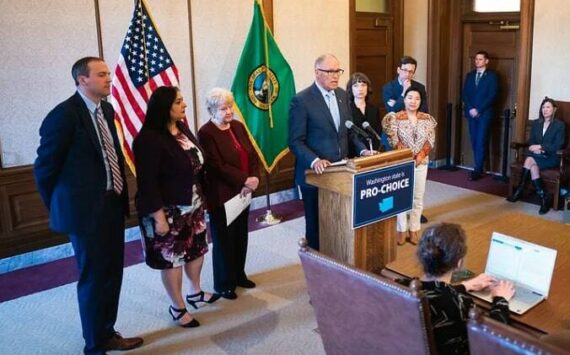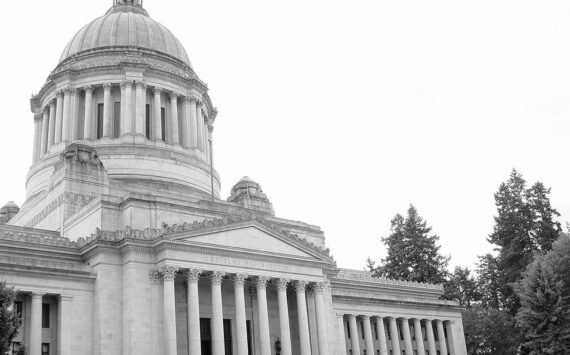An exchange between the chief House and Senate budget writers Tuesday doesn’t bode well for those counting on lawmakers to strike a deal in time to prevent the first-ever shut down of state government.
Democratic Rep. Timm Ormsby, of Spokane, said his caucus had made a “substantial offer” and “it’s fair to say the ball is in the Senate’s court.”
Republican Sen. John Braun, of Centralia, disagreed diplomatically on the location of the budget ball, noting “both sides have made substantive offers.”
And so the disagreements continued on the penultimate day of a second monthlong special session in which the primary task for the Democrat-controlled House and Republican-led Senate has been to write a new two-year state spending plan. They failed and on Wednesday Gov. Jay Inslee is expected to announce the start of a third extra session.
It’s crunch time for lawmakers. They must deliver a budget to Inslee to sign by midnight June 30 or else the next day state parks will close, critical social services will stop and thousands of workers will be laid off as parts of government are shut down.
“We are still pretty far apart in terms of reaching a final agreement. It’s looking harder and harder to find a path,” said Rep. June Robinson, D-Everett, another member of the budget negotiating team for the House majority. “I hope we can make it come together in the next 10 days. We’re all committed to getting it done.”
House Minority Leader Dan Kristiansen, R-Snohomish, said early Tuesday he is frustrated, yet he is also confident a shut down will be averted as it was in previous bouts of brinkmanship in 2013 and 2015. Two years ago, lawmakers nailed down a deal June 27.
“Both sides are holding onto their big asks and they’re waiting until the bitter end. We’ve always come to terms with it and people backed off their stuff and take what they can get in negotiations,” he said. “Why in the heck is it taking right up until the deadline to do it?”
His optimism surged a bit after an afternoon conference call with the leaders of the other caucuses and Inslee. He said he heard the Senate Republicans planned to respond to the House Democrats’ offer Tuesday. There was talk about everyone returning next week to soldier through to the finish.
“There is no intention of having a shutdown,” he said.
Tuesday morning, lawmakers did get a smidgen of additional information with release of a new revenue forecast from the state’s chief economist. It shows collections for the general fund and related accounts are expected to reach $41.7 billion in the next two-year budget cycle which is about $80 million higher than the March forecast.
In addition, the state will start the biennium with about $2.5 billion in reserves, according to the governor’s budget office.
“It’s not negative,” Robinson said of the bump in projected revenue collections. “It’s not enough positive to make a big difference when we’re talking about billions of dollars.”
The House has approved a two-year $44.6 billion spending plan that relies on $3 billion in new or higher taxes with much of the money earmarked for public schools, mental health programs and pay raises for state workers. Of the total, $715 million would come from a capital gains tax and $1.2 billion from an increase in the business tax rate. However, the House has not voted on any tax proposal.
The Senate has approved a $43.3 billion blueprint containing an increase in the property tax of $1.55 per $1,000 to cover the state’s basic education responsibilities. Under their plan, money raised from the increase would supplant what school districts are now paying with local levies. Republicans, who also want to reduce local levies, seek to put their tax plan on the ballot for voters to approve.
A central sticking point continues to be how the state will provide public schools with ample funding as demanded by the Supreme Court in the McCleary case. They know it will cost several billion dollars in the next couple of years and are wrestling on where those dollars will come from and when they will be spent.
The court set a Sept. 1, 2018, deadline for the state to comply with the 2012 decision. And it wants to see a compliance plan in place before the Legislature adjourns this year. Justices, who have been frustrated by the pace of progress, found the state in contempt and imposed a $100,000-a-day fine. As of Tuesday those fines totaled $67.7 million.
Education funding is the largest but not the only impediment. Expanding mental health services, creating a new agency focused on serving children and families, and responding to the Supreme Court’s water rights decision known as Hirst are others. And there are still talks going on about a paid family leave program and new rules for use of high school assessments.
“We still have lots and lots and lots of decisions to make,” Robinson said.
This story originally ran in the Everett Herald.







